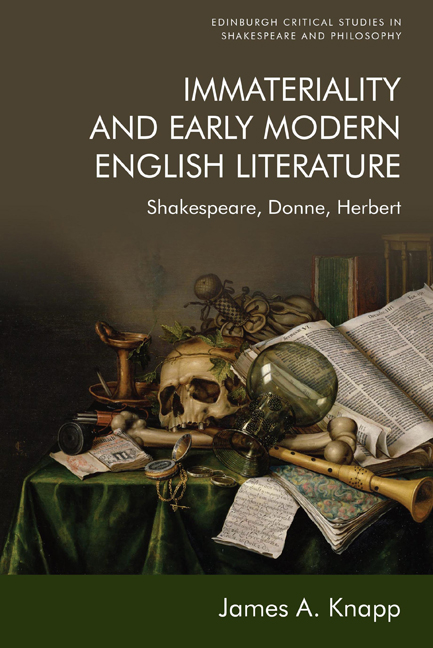2 - ‘There are more things in heaven and earth’: Material and Immaterial Substance and Early Modern Ontology
Published online by Cambridge University Press: 10 October 2020
Summary
Iago's claim, ‘I am not what I am’ (1.1.63), can be read as his assurance to Roderigo that he is playing Othello by appearing to be what he is not (‘I am not what I appear to be’). On one level, of course, this has to be what he means. But what he actually says invokes metaphysical questions related to the material/immaterial distinction that is the subject of this book. As an explicit inversion of the divine enunciation ‘I am that I am’ (Ex. 3: 14), Iago at the very least gestures at his own non-being. God's being is self-evidently reflected in the form of the scriptural statement, which amounts to ‘I exist, I am.’ Iago's inversion of the positive statement appears to result in an equally self-evident statement of non-existence: ‘I am not.’ But as an utterance, the statement is impossible, a paradox: if the ‘I’ does not exist, there can be no statement of its non-existence. This was essentially Descartes’ insight with the cogito: even in thinking one's non-existence, one confirms that existence. Despite the categorical sweep of Iago's statement, something remains after the negation. If Iago means to say ‘I am not that General's lackey’, he suggests that he is something else, though he is silent on what exactly that is.
‘I am not’ is opposed to ‘I am’ in the same way that ‘immaterial’ is opposed to ‘material’. As we saw in the last chapter, the primary sense of ‘immaterial’ is ‘not material’. But related senses of the word are also instructive: the legal sense, ‘irrelevant’, for example, labels a thing as nothing worth considering, despite the fact that the irrelevant thing clearly exists. This sense is found in everyday language, as in the common phrase ‘It is nothing’, often uttered in response to the question ‘What is it?’ or ‘What is the matter?’ Most of the time when people say ‘it is nothing’ they do not mean that ‘it’ lacks existence; more likely they mean that ‘it’ lacks the quality of relevance, that it doesn't matter. Nevertheless, the distinction between something and nothing, like that between the material and immaterial, carries ontological freight, especially in logic.
- Type
- Chapter
- Information
- Immateriality and Early Modern English LiteratureShakespeare, Donne, Herbert, pp. 63 - 88Publisher: Edinburgh University PressPrint publication year: 2020



